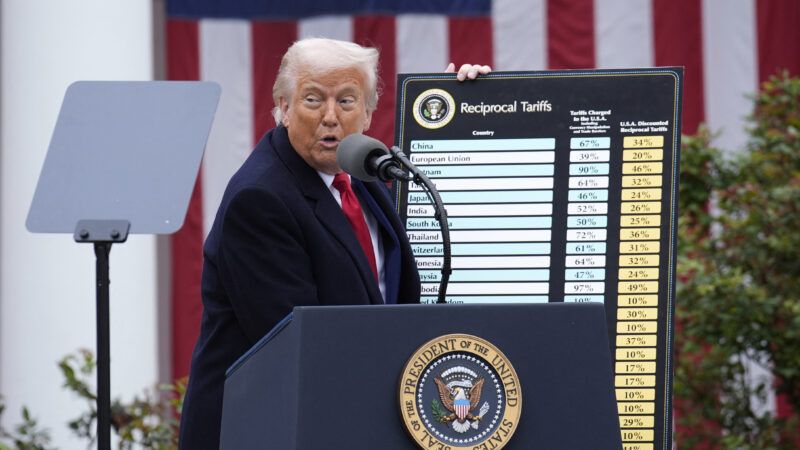Donald Trump and Oren Cass Promised Tariffs Would Bring Prosperity. Both Are Now Confronting Reality.
The Trump administration is reportedly looking to ease some tariffs on goods not produced in the U.S., as the consequences of a universal tariff scheme are becoming impossible to ignore.

In April, as President Donald Trump announced his so-called "Liberation Day" tariffs that would target imports of nearly all goods sourced from friend and foe alike, one of the biggest cheerleaders for trade protectionism took a victory lap.
Those new tariffs "confirm the end of the disastrous [World Trade Organization] era and lay the groundwork for a new set of arrangements in the international economy that prioritize the national interest and the flourishing of the nation's working families," wrote Oren Cass, the former Mitt Romney advisor who now runs American Compass.
A week later, during an interview with two reporters from Vox, Cass was asked whether the Trump administration was making an error by imposing a global tariff on all imports (including "shirts and screws and picture frames and bicycles.") instead of focusing on critical items like semiconductors.
"I think a global tariff is the right way to do things," Cass said. "It's a very simple, broad policy that conveys a value that we see in domestic production."
That is, more or less, the view that the White House adopted during the first year of Trump's second term: Making stuff in America matters, and the best way to encourage more production in America is to make it more expensive to import anything made somewhere.
Of course, there are two major flaws with that logic. First, there are things that can't be made in America—or can't be made here in sufficient quantities to satisfy Americans' demand. Coffee, chocolate, bananas, and many other agricultural products, for example.
Second, making things in America often requires importing raw materials or intermediate goods. More than 50 percent of all American imports are unfinished goods that are used to make other things, from cars to houses to industrial pumping equipment and chocolate bars. If all those materials are suddenly more expensive, it becomes harder, not easier, to manufacture more things here.
Economists and other experts in business, manufacturing, and logistics were warning about those problems even before Trump's April announcement. But the White House's top economic advisors and protectionism fans like Cass dismissed those worries and promised that central planning would be better for everyone.
In October, Cass wrote in The Atlantic that Trump's global tariffs "takes the right approach to addressing globalization's failures." He dismissed tariff critics as unpatriotic nerds who "don't believe that manufacturing things domestically matters." (For a deep and thorough rebuttal of those claims, check out this response, crafted by two trade experts at the Peterson Institute for International Economics.)
Yet the evidence is now becoming overwhelming: The economists knew what they were talking about.
The manufacturing sector has dipped into a recession this year, as executives have reported higher input prices, fewer new orders, and declining employment—all of which could be attributed to the sudden tariff hikes imposed earlier this year. Meanwhile, surveys of business owners have found very little support for tariffs, while most say Trump's trade policies are increasing uncertainty and raising costs.
Consumers have been hit with one of the biggest tax increases in American history. Retail prices, which had been falling steadily since the pandemic, began increasing earlier this year as businesses passed along tariff costs, according to the Harvard Business School. Overall, businesses have faced $1.2 trillion in tariff costs this year, and consumers have paid most of that, according to one estimate from S&P Global.
So much for the "flourishing" of the nation's working families.
Reality may finally be puncturing these tariff-induced delusions. The Wall Street Journal reported this weekend that the White House is "tiptoeing" away from hostility to foreign trade and looking at ways to ease tariffs on goods that aren't produced in the United States. The administration recently issued a new set of temporary tariff exemptions for car parts that will provide automakers with some relief until 2030, and the White House has granted new authority to the Commerce Department and U.S. Trade Representative to exempt products from tariffs without a direct order from the president. As the Journal notes, all of that is a significant retreat from the "no exemptions, no exceptions" position that the White House had previously staked out.
And now Cass seems to be reconsidering some of his support for the administration's universal tariffs too. In an essay published last week by Foreign Affairs, Cass wrote that Trump's "trade agenda has appeared haphazard, and confronting all countries suddenly, simultaneously, and harshly has needlessly antagonized allies and heightened uncertainty." He specifically singled out the administration's tariffs on India as an example of how it has been "difficult to discern the logic" behind some of Trump's tariff maneuvers.
That is a long way from a rejection of the White House's agenda, of course, or an admission that the tariffs have failed to achieve their primary policy aims. Still, it represents a clear if subtle break—a tiptoeing away, to borrow the Journal's phrase—from his support for global tariffs that, definitionally, require confronting all countries simultaneously.
These are welcome signals, no doubt, even though it would be shocking to see either Trump or Cass fully embrace the recognition that tariffs are more costly than beneficial. The global trade war that has defined much of Trump's second-term agenda is not over yet, but the cracks in that policy are now becoming too obvious for even the most hardened tariff advocates to ignore.
Huh, maybe the economists knew what they were talking about after all.


Show Comments (71)